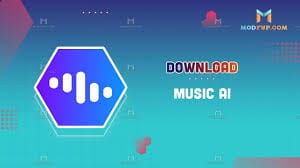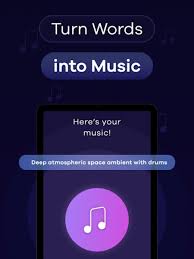AI music apps
The world of music creation has undergone a profound transformation in recent years, thanks to the advent of artificial intelligence. Among the most exciting developments are AI music apps, which have democratized music production, enabling both amateurs and professionals to create high-quality compositions with unprecedented ease. These applications leverage advanced algorithms to generate melodies, harmonies, and even full tracks, offering a new frontier for creativity. This article explores the rise of AI generated music apps, their features, benefits, and their impact on the music industry, with a particular focus on AI music generator apps and the growing popularity of AI music generator Android apps.

The Evolution of AI in Music Creation
Music has always been a blend of creativity and technology, from the invention of the phonograph to digital audio workstations (DAWs). However, the integration of AI into music production marks a significant leap forward. AI music apps use machine learning models trained on vast datasets of musical compositions to generate original tracks or assist users in crafting their own. These apps analyze patterns in rhythm, melody, and harmony, enabling them to produce music that aligns with specific genres, moods, or user preferences.
The appeal of AI generated music apps lies in their accessibility. Unlike traditional music production, which often requires expensive equipment, technical expertise, and years of practice, these apps allow anyone with a smartphone or computer to create professional-sounding music. For instance, an AI music generator app can produce a fully orchestrated track in minutes, based on simple inputs like genre selection or a hummed melody. This has opened the door to music creation for hobbyists, content creators, and even professional musicians looking to experiment with new ideas.
How AI Music Apps Work
At the core of an AI music generator app is a sophisticated algorithm, often powered by neural networks. These networks are trained on diverse musical datasets, encompassing everything from classical symphonies to modern pop hits. When a user inputs parameters—such as a genre, tempo, or mood—the app processes these inputs and generates a unique composition. Some apps even allow users to upload audio snippets, such as a vocal melody or guitar riff, which the AI then builds upon to create a complete track.

For example, an AI music generator Android app might offer a user-friendly interface where individuals can select options like “upbeat pop” or “cinematic orchestral” and adjust sliders for elements like complexity or energy. The app then produces a track that can be further customized or exported for use in videos, podcasts, or personal projects. Advanced apps may also incorporate real-time collaboration features, enabling users to work with others or receive suggestions from the AI to refine their compositions.
Benefits of AI Music Apps
The rise of AI music apps has brought numerous benefits to both creators and the broader music industry. Here are some of the key advantages:
- Accessibility: AI generated music apps eliminate many barriers to entry in music production. They require minimal technical knowledge, making them ideal for beginners. Additionally, many of these apps are available for free or at a low cost, compared to traditional DAWs or studio equipment.
- Speed and Efficiency: Creating a song from scratch can take hours or even days, but an AI music generator app can produce a track in seconds. This is particularly valuable for content creators who need background music for videos, advertisements, or social media posts.
- Inspiration and Collaboration: For professional musicians, AI music generator Android apps serve as a source of inspiration. These apps can generate ideas for melodies, chord progressions, or arrangements, helping artists overcome creative blocks. Some apps even allow users to collaborate with the AI, blending human creativity with machine precision.
- Customization: Many AI music apps offer extensive customization options, allowing users to tweak every aspect of a track, from instrumentation to tempo. This ensures that the final product aligns with the user’s vision.
- Versatility: Whether you’re creating a lo-fi hip-hop beat, a classical piano piece, or an electronic dance track, AI generated music apps can cater to a wide range of genres and styles. This versatility makes them suitable for diverseburgo
- Cost-Effectiveness: Many AI music generator apps are affordable or free, making them accessible to a wide audience. This is particularly appealing for independent creators who may not have the budget for professional studio equipment.
The Popularity of AI Music Generator Android Apps
The proliferation of smartphones has fueled the demand for AI music generator Android apps. These apps are designed to run seamlessly on Android devices, offering the same powerful features as their desktop counterparts in a portable format. The convenience of creating music on the go has made these apps especially popular among young creators, influencers, and mobile content producers.
AI music generator Android apps often come with intuitive interfaces tailored for touchscreens, making them easy to use even for those with no prior music production experience. Some apps integrate with cloud services, allowing users to save and share their creations effortlessly. Additionally, many of these apps are optimized for low-resource devices, ensuring smooth performance on a wide range of Android phones and tablets.
Popular examples of AI music generator Android apps include platforms like Soundtrap, BandLab, and AI-driven tools like Amper Music, which offer mobile-friendly interfaces and robust music generation capabilities. These apps often include features like vocal tuning, sound libraries, and AI-assisted mixing, making them powerful tools for mobile music creation.
The Impact on the Music Industry
The rise of AI music apps has sparked both excitement and debate within the music industry. On one hand, these apps empower a new generation of creators, enabling them to produce music that rivals professional quality without significant investment. This democratization has led to an explosion of independent music, with platforms like SoundCloud and YouTube filled with AI-assisted tracks created by amateurs and professionals alike.
However, some critics argue that AI generated music apps could dilute the authenticity of music creation. They worry that AI-generated tracks may lack the emotional depth or originality of human-composed music. Others counter that these apps are simply tools, much like guitars or synthesizers, that enhance rather than replace human creativity. The ability of AI music generator apps to assist with tasks like arrangement and mastering allows artists to focus on the creative aspects of music, such as storytelling and emotional expression.

Challenges and Limitations
Despite their advantages, AI music apps are not without challenges. One common issue is the learning curve associated with advanced features. While many apps are designed for beginners, mastering their full potential can take time, especially for users unfamiliar with music theory. Additionally, the quality of AI-generated music depends heavily on the app’s training data and algorithms, which can sometimes result in generic or repetitive compositions.
Another concern is the ethical question of copyright and originality. Since AI music generator apps are trained on existing music, there is a risk that generated tracks may inadvertently resemble copyrighted material. Developers are addressing this by refining their algorithms to prioritize originality and by offering licensing options for AI-generated music.
The Future of AI Music Apps
The future of AI music apps is bright, with ongoing advancements in AI technology promising even more sophisticated features. Future apps may incorporate real-time voice recognition, allowing users to sing or hum melodies that the AI instantly transforms into full compositions. Integration with virtual reality (VR) and augmented reality (AR) could also create immersive music-making experiences, where users can visually interact with their compositions in 3D environments.
Moreover, the growing popularity of AI music generator Android apps suggests that mobile music creation will continue to expand. As 5G networks and mobile hardware improve, these apps will become even more powerful, enabling complex music production tasks on the go. The integration of AI with other technologies, such as blockchain for copyright management or spatial audio for immersive sound, could further enhance the capabilities of these apps.
Conclusion
The rise of AI music apps represents a paradigm shift in music creation, making it more accessible, efficient, and versatile than ever before. AI generated music apps empower creators of all skill levels to produce high-quality tracks, while AI music generator apps and AI music generator Android apps bring these capabilities to the fingertips of mobile users. While challenges like originality and learning curves remain, the benefits of these apps—accessibility, speed, and customization—far outweigh the drawbacks for many creators. As AI technology continues to evolve, these apps will undoubtedly play a central role in shaping the future of music, blending human creativity with the power.